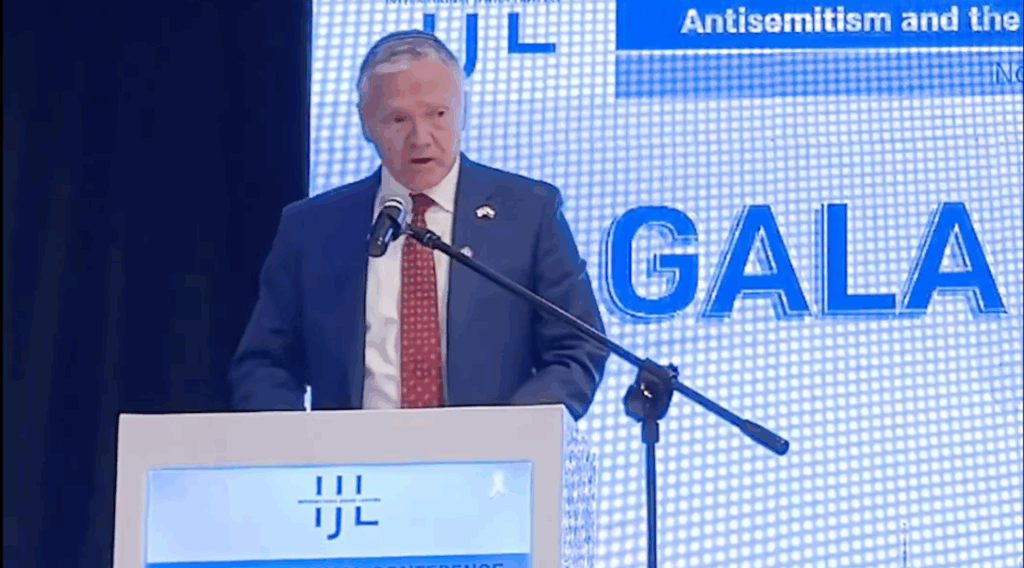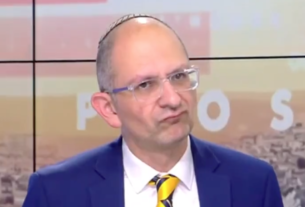The new U.S. ambassador to Poland, Thomas Rose, has ignited debate after delivering a speech in Warsaw calling the idea of Polish complicity a “grotesque falsehood” on par with antisemitic conspiracy theories.
Meanwhile, Polish government officials criticized a post by Israel’s Holocaust memorial about the Holocaust in Poland, in a sign of renewed pressure over public characterizations of Poland’s role in the Holocaust.
Speaking last week at the annual convention of the International Association of Jewish Lawyers and Jurists, Rose denounced what he said was “the slander that Poland somehow bears responsibility for the crimes committed by others.”
The idea of Polish complicity, which the Polish government rejects, had “poisoned relations between Jews and Poles, between Israel and Poland and between the United States and Poland for decades,” said Rose, the Jewish former publisher of the Jerusalem Post who was confirmed to the ambassadorship on Oct. 7.
“For decades, Poland has suffered a grave historic injustice, the persistent belief that Poland shares guilt for the barbaric crimes committed against it. It’s a grotesque falsehood and the equivalent of a blood libel against the Polish people and Polish nation,” he said, using a term that typically refers to an antisemitic lie that has spurred violence against Jews. “No nation fought longer or suffered more, which is why applying a debtor-creditor relationship between Poland and the world for a genocide perpetrated by others on its soil against its people is historically false, and I believe morally scandalous.”
Rose was repeating ideas that he had laid out during his confirmation hearing over the summer — which themselves marked a departure from the stance the State Department took during the first Trump administration.
In 2018, then-Secretary of State Rex Tillerson issued a rare rebuke of the Polish government’s decision to criminalize — and potentially punish with prison time — expressions of blame against Poland for crimes that the government maintained had been exclusively carried out by Germans.
The State Department did not respond to a request for comment about whether Rose’s speech in Warsaw reflects an official U.S. position.
While hundreds of Poles are recognized as “Righteous Among the Nations” for their roles in protecting Jews during the Holocaust, there is a wide consensus — including from Polish institutions in the past — that many other Poles participated in the mass slaughter that claimed 3 million Polish Jews, nearly 90% of those who had lived there before the war. Poles also killed Jews returning to their village after the war, in an incident seen as a symbol of Polish complicity.
Earlier this year, Polish voters elected a right-wing Holocaust revisionist historian as president. Karol Nowricki comes from the Law and Justice Party, which promotes historical narratives about Polish victimhood and resistance to the Nazis, while delegitimizing research on Polish antisemitism or Poles who killed Jews.
While the prime minister does not come from the Law and Justice Party, it holds a crucial role in governance in Poland, seen as a bulwark for U.S. interests in the region against Russia.
Rose said he hoped his speech leads to further discussion of how Poland has been maligned in Holocaust history. Sharing his speech on X, he wrote, “Yesterday evening, I began a conversation that—I hope—will contribute to correcting a very unfair historical narrative about Poland.”
On Sunday, a second dustup took place, as Yad Vashem, Israel’s Holocaust memorial and museum posted on X about the yellow stars that Polish Jews were forced to wear.
“Poland was the first country where Jews were forced to wear a distinctive badge in order to isolate them from the surrounding population,” Yad Vashem tweeted.
Radosław Sikorski, Poland’s minister of foreign affairs, responded with a request for a correction: “Please specify that it was ‚German-occupied’ Poland, @yadvashem,” he wrote.
Polish officials from across the ideological spectrum shared in the criticism. “Poland didn’t exist at that time, after it was raided by Germany and Russia. Its territory was partitioned and incorporated to the Third Reich and the USSR,” a left-wing lawmaker, Anna-Maria Żukowska, said in a tweet that tagged the Israeli embassy.
Both Yad Vashem and its chairman, Dani Dayan, Yad Vashem’s chairman, soon responded acknowledging the concerns. “Yad Vashem presents the historical realities of Nazism and WWII, including countries under German occupation, control or influence. Poland was indeed under German occupation,” Dayan wrote. “This is clearly reflected in our material. Any other interpretation misreads our commitment to accuracy.”
Power the news that matters to you. Before 2025 ends, help JR’s independent, award-winning newsroom document Jewish history in real-time.




